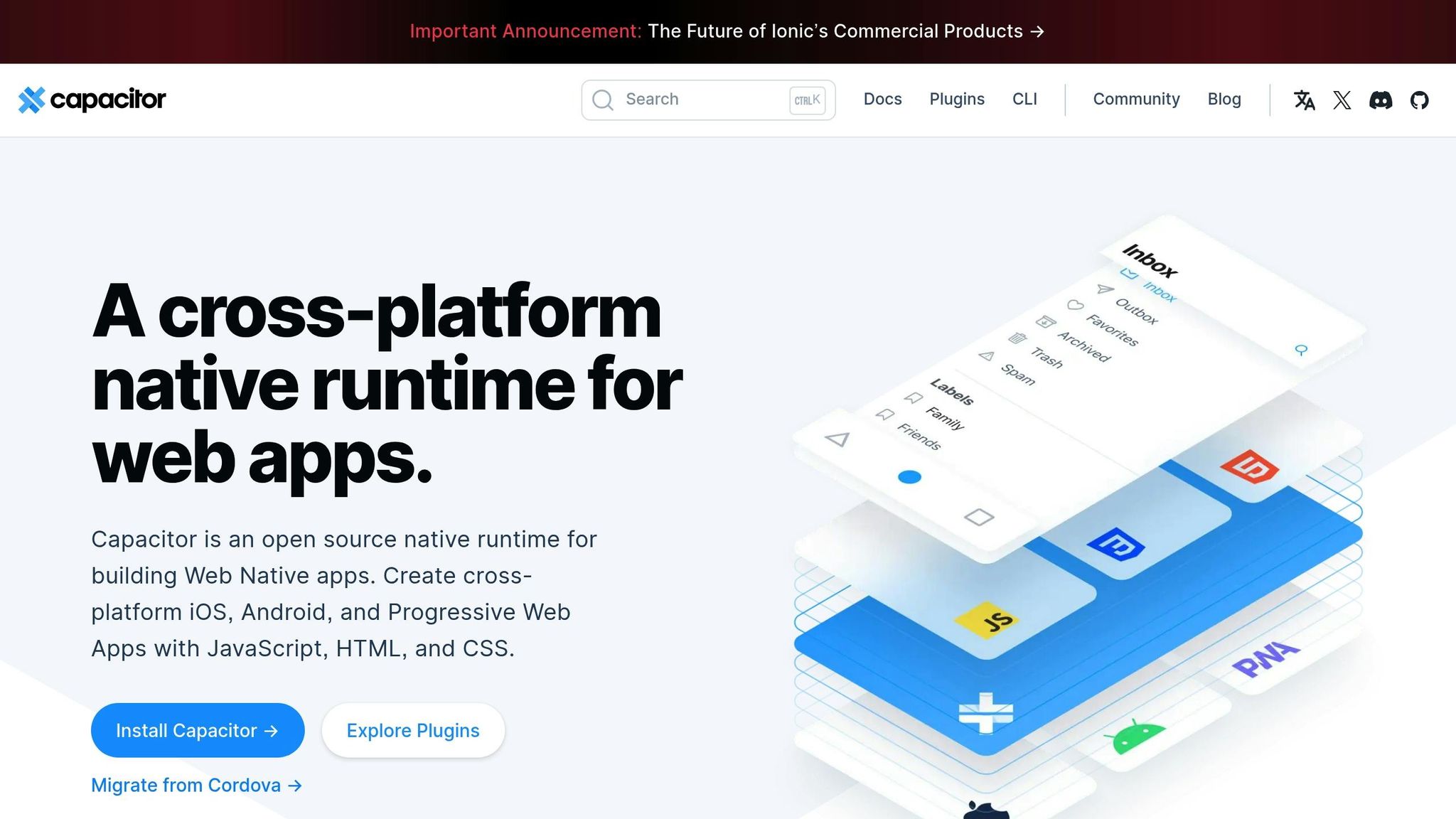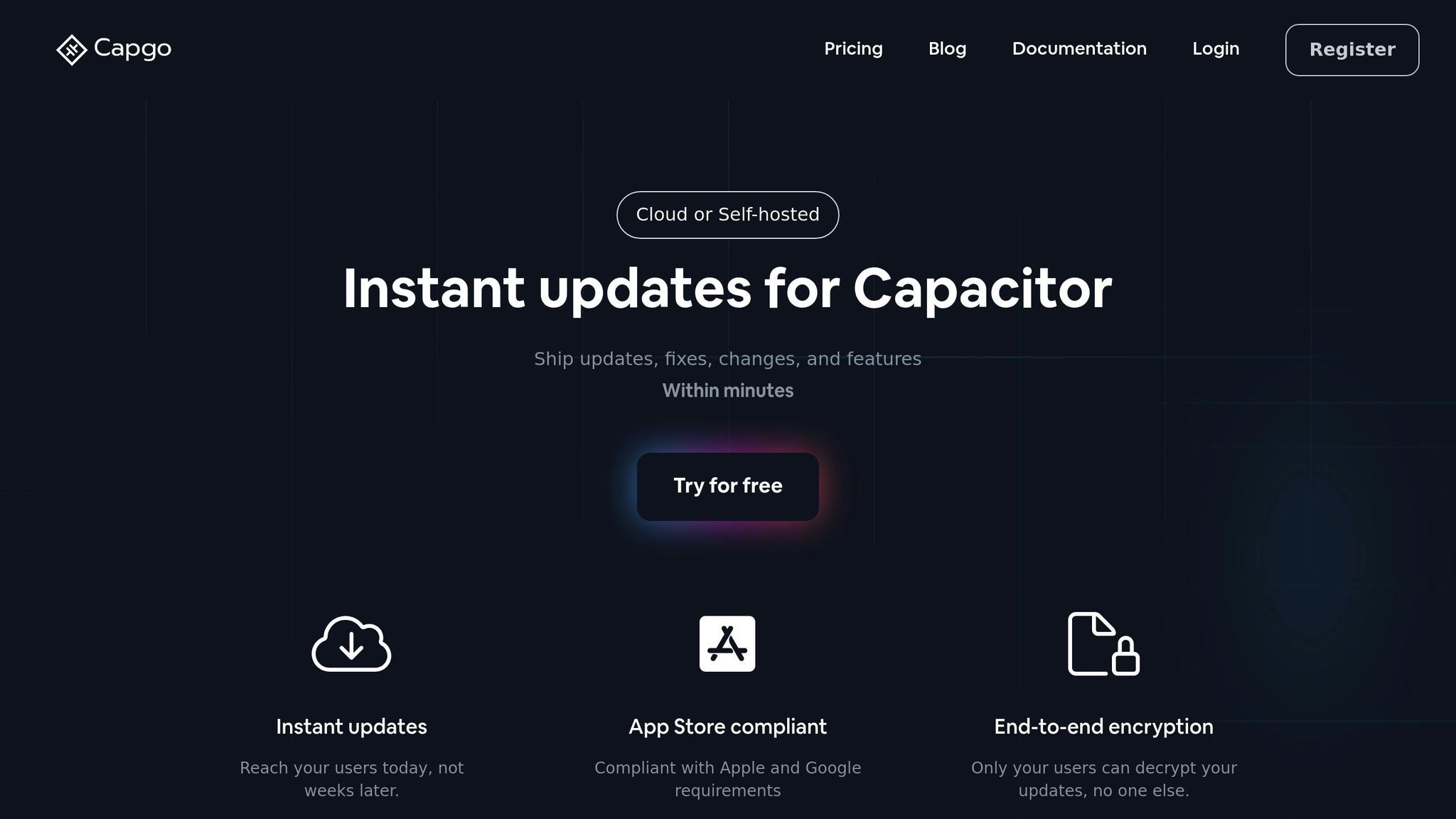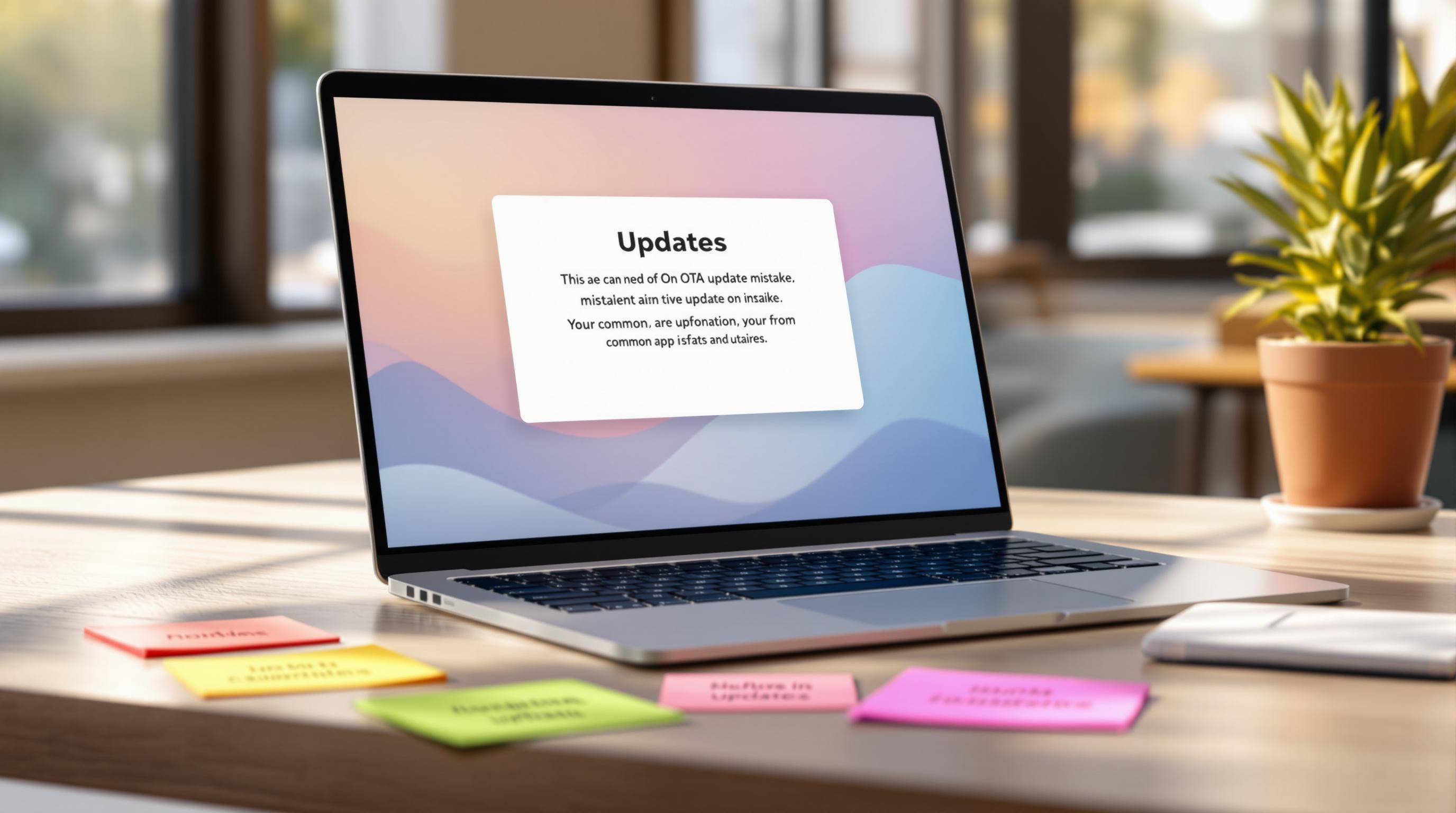Want to quickly fix bugs or add features without app store delays? Over-the-Air (OTA) updates for Capacitor apps let you push updates directly to users, bypassing the lengthy app store review process. But staying compliant with Apple and Google Play rules is critical to avoid app rejection or removal.
Key Takeaways:
- What are OTA updates? They let you update app content (like bug fixes or UI tweaks) instantly via a secure CDN, without requiring users to download updates manually.
- Why use them? OTA updates reach 95% of active users within 24 hours, saving time and improving user experience.
- Compliance matters: Apple restricts OTA updates to non-executable content (e.g., web assets), while Google allows more flexibility but enforces strict security and user consent rules.
- Tools like Capgo help: Capgo provides encryption, rollback options, error tracking, and analytics to ensure fast, secure, and compliant OTA updates.
Pro tip: Use OTA updates for minor fixes or content changes, but always submit major changes or new features for app store review.
Read on for a step-by-step guide to implementing OTA updates while staying compliant.
OTA Updates Basics for Capacitor

How OTA Updates Work
OTA (Over-The-Air) updates allow developers to push new code directly to users’ devices without requiring them to download updates from an app store. These updates are delivered through a secure content delivery network (CDN) and are downloaded in the background while users continue using the app. By focusing only on the parts of the code that have changed, the system ensures quicker downloads, leveraging the speed and efficiency of global CDN distribution [1].
The process is straightforward: developers create the updated code, deploy it securely via a CDN, and the app automatically installs the changes. This streamlined approach brings several advantages for both developers and users.
Benefits of OTA Updates
OTA updates offer multiple advantages to both developers and end-users. Here’s a quick breakdown:
| Benefit | Impact |
|---|---|
| Rapid Deployment | Updates can reach users within minutes instead of days. |
| Bandwidth Efficiency | Only the modified portions of the code are downloaded, saving data. |
| User Convenience | No need for manual updates or app store visits. |
| Development Agility | Enables faster bug fixes and feature releases. |
“We practice agile development and @Capgo is mission-critical in delivering continuously to our users!” – Rodrigo Mantica [1]
Common OTA Implementation Issues
Despite these benefits, implementing OTA updates can come with challenges. Data from 750 apps highlights some common issues [1]:
- Security Concerns: End-to-end encryption is critical to prevent tampering or unauthorized access.
- Version Management: Using a channel system helps manage beta testing and phased rollouts effectively.
- Update Monitoring: Without proper tracking, failed updates can go unnoticed. Analytics and error tracking are essential, as global success rates of 82% emphasize the importance of monitoring [1].
“We rolled out Capgo OTA updates in production for our user base of +5000. We’re seeing very smooth operation almost all our users are up to date within minutes of the OTA being deployed to @Capgo.” – Colenso [1]
To ensure reliable OTA updates, developers should focus on proactive monitoring and maintain rollback options for quick issue resolution. With an average API response time of 434ms, optimizing the update delivery infrastructure is also crucial [1].
App Store Rules for OTA Updates
Apple’s OTA Update Rules
Apple has strict policies for OTA (Over-The-Air) updates in iOS apps. These updates cannot change the app’s core functionality or bypass the App Store review process. For hybrid apps, updates are limited to non-executable content, such as web asset updates, to ensure security and maintain compliance with Apple’s guidelines.
Google Play’s OTA Update Rules
Google Play allows more flexibility for OTA updates but still enforces strong security standards. Developers must follow these key guidelines:
| Requirement | Details |
|---|---|
| Security Protocols | Updates must be delivered over secure connections, such as HTTPS. |
| Version Control | A proper versioning system must be in place to track changes. |
| User Consent | Users must give explicit permission for any major changes. |
| Update Scope | Larger code changes are allowed compared to iOS, but security remains a priority. |
Policy Violation Examples
Violating OTA update policies can result in serious consequences. Here are some common examples:
- Feature Bypass: Rolling out major feature updates that avoid the review process.
- Security Breaches: Using insecure delivery methods that put user data at risk.
- Core Functionality Changes: Altering the app’s main functionality through an OTA update.
Both Apple and Google emphasize user security and experience. While Google Play offers slightly more leeway, developers should use OTA updates for minor improvements like bug fixes, content updates, or small UI tweaks. Major changes or new features should always go through the official review process to stay compliant.
OTA Update Guidelines
To stay compliant with app store rules, it’s important to follow specific guidelines when using OTA (Over-the-Air) updates for Capacitor apps. These practices help ensure updates are safe and align with platform policies.
Focus on Non-Critical Updates
OTA updates should be limited to non-essential elements such as visual assets or simple configurations. Avoid altering core executable logic or adding new features that might require a full app review. By sticking to these boundaries, you can maintain compliance while keeping updates simple. Once you’ve defined these limitations, having a strong version control system is crucial.
Version Control Best Practices
A solid version control strategy includes features like automated versioning, phased rollouts, and rollback options. Here’s how these methods help:
- Automated Versioning: Use CI/CD tools to track versions accurately and efficiently.
- Phased Rollouts: Release updates to a small group of testers first, then expand to all users.
- Quick Rollback: In case of issues, revert to a previous version instantly.
These practices reduce risks and ensure your updates meet app store requirements.
Keeping Users in the Loop
- Automatic Updates: Updates can be installed in the background, but users should still be informed. Tools like Capgo make it simple to automate installations while keeping users updated.
- Monitoring and Feedback: Use analytics, error tracking, and feedback channels to monitor the success of installations and address any problems.
Clear communication fosters trust with users and reinforces compliance with app store guidelines.
“One-click rollback to any previous version if needed” – Capgo [1]
Using Capgo for OTA Updates

Capgo provides a solution for managing over-the-air (OTA) updates in Capacitor apps, addressing compliance requirements with an integrated system. With more than 750 apps in production and 23.5 million updates delivered, Capgo ensures a smooth and compliant update process [1].
How Capgo Manages Updates
Capgo streamlines the update process while ensuring updates are efficient and meet compliance standards. Key features include:
- End-to-End Encryption: Updates are encrypted and accessible only to authorized users.
- Partial Updates: Instead of downloading entire bundles, only changed components are updated. This allows for an average download time of just 114ms for a 5MB bundle.
- High Performance: Within 24 hours of deployment, update success rates reach 95%.
Compliance Tools Offered by Capgo
Capgo includes tools designed to maintain compliance and ensure smooth updates:
| Feature | Compliance Benefit |
|---|---|
| Channel System | Allows controlled beta testing and phased rollouts |
| One-Click Rollback | Quickly addresses issues by reverting updates |
| Error Tracking | Detects and resolves errors proactively |
| Analytics Dashboard | Tracks update performance and user adoption |
These tools help maintain safe content and version control, contributing to an 82% global update success rate while staying compliant with platform guidelines [1].
Getting Started with Capgo
Getting started with Capgo is fast and simple. Use the following command:
npx @capgo/cli initThe setup process takes less than 15 minutes to deploy your first update. Capgo also supports CI/CD integration with platforms like GitHub Actions and GitLab CI.
Long-term Compliance Management
Staying compliant with app store policies over the long term requires consistent effort and attention. Regularly reviewing and monitoring for policy updates is key to avoiding potential issues.
Regular Policy Checks
Frequent policy reviews help you stay ahead of compliance challenges. Tools like Capgo’s analytics dashboard simplify this process by identifying potential problems early, giving you time to address them before they escalate.
Policy Change Monitoring
Keeping up with policy changes involves a mix of automated tools and manual oversight. Capgo supports this process by offering:
- Real-time updates to spot compliance issues as they arise
- Success rate tracking across different app versions
- Controlled update distribution to specific user groups
“We practice agile development and @Capgo is mission-critical in delivering continuously to our users!” - Rodrigo Mantica [1]
Fixing Policy Violations
Quickly addressing policy violations is crucial to maintaining high update success rates. Capgo makes this easier by providing:
1. Immediate rollback options
Quickly revert updates to avoid further issues.
2. Error tracking
Pinpoint the root cause of violations for precise fixes.
3. Channel-based testing
Test fixes on a select group of users before rolling out updates widely.
Capgo also ensures compliance with robust security measures like end-to-end encryption and a partial update system, which minimize disruption for users while maintaining high standards.
Conclusion
Managing OTA updates while staying compliant with app store rules requires careful planning and the right tools. Capgo, with over 23.5 million updates delivered and 750 apps in production [1], offers a dependable solution for handling OTA updates within platform guidelines.
The secret to effective OTA update management lies in using robust compliance tools and monitoring systems. By employing end-to-end encryption and strictly following platform requirements, developers can ensure both security and smooth operations during updates.
Even experts in the field emphasize the importance of fast and compliant updates. As NASA’s OSIRIS-REx team noted:
“@Capgo is a smart way to make hot code pushes (and not for all the money in the world like with @AppFlow) :-)” [1]
For developers aiming to balance compliance with timely updates, a solid update management system is crucial. Tools offering features like instant rollbacks, real-time analytics, and channel-based distribution help teams deliver updates efficiently while staying within compliance boundaries.




